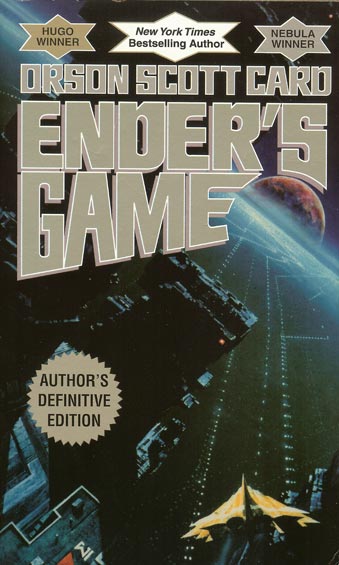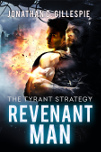Review: Ender’s Game, by Orson Scott Card
May 23, 2012 in General Topics
 The truly gifted make their accomplishments look easy. But hidden from those seeing the end product are the hours of toil, effort, and self-doubt. And though I imagine a young Orson Scott Card labored mightily on Ender’s Game, a reader might be shocked with the novel’s sublime simplicity of prose. The hallmark of a powerful book is it demands reflection. Ender’s Game is powerful. (Slight spoilers ahead)
The truly gifted make their accomplishments look easy. But hidden from those seeing the end product are the hours of toil, effort, and self-doubt. And though I imagine a young Orson Scott Card labored mightily on Ender’s Game, a reader might be shocked with the novel’s sublime simplicity of prose. The hallmark of a powerful book is it demands reflection. Ender’s Game is powerful. (Slight spoilers ahead)
Perhaps some of the obstacles Card faced as a burgeoning writer became internalized; reflected, in spirit, in the many games eponymous character Andrew “Ender” Wiggin faces when selected for “Battle School”.
Ah, our sympathetic, eponymous Ender. He is too good for the Earth he is driven into protecting. He ends up sacrificing so much. Sound familiar? Whether Card intended to invoke Christ’s sacrifice, or not, one does see parallels.
It’s highly implied that Ender, his sister Valentine, and his sadistic brother, Peter, are all the progeny of some government project designed to produce supermen capable of serving as strategic geniuses. Ender, chosen over his siblings as the most promising, is just six years old when approached by the military to enter the Battle School, where he faces a nigh-fascist form of rigorous training, and combat “games” designed to select an overall commander to face off against humanity’s greatest threat: the “Buggers”.
The Buggers (formal name: Formics) are bad news, a race of spacefaring aliens that almost destroyed humanity on more than one occassion. We’re not shown much of the aliens for a long while, lending them an aura of mystery that serves to underscore the pressure placed on young Ender. Everything about the Bugger threat is urgent and immediate, yet the removal of any direct alien contact (or so it seems) actually leads the reader to begin asking a number of troubling questions, which Card seems to revel in taking his time answering. This works delightfully.
In fact, action junkies wanting a space opera slugfest between opposing capital ships might be surprised that the book doesn’t really grant much of what its setup might seem to imply. But I’ll bet they’ll never miss those tropes.
This is because the greatest enemies surround Ender from the moment his shuttle docks at the Battle School. In addition to the (predictable) presence of bullies, he faces calculating administrators who regard Ender as nothing more than an asset.
Ender’s value — in their minds only defined in regards to the coming war — dovetails with one of the novel’s central themes, perhaps the key theme: survival of the species versus the individual. Is Ender a tool to be used to save mankind? Do his thoughts and feelings really matter, beyond their relation to defeating the Bugger “menace”?
Ender progresses through Battle School, acquiring a number of allies along the way (disciples, I must ask, Mr. Card?), which most readers will realize the author is earmarking for a later purpose. This, the bulk of the novel — Battle School and Ender’s slow progression up the ranks of the “board” leaders — is possibly even better in its examination of future military life than Robert Heinlein’s classic Starship Troopers. Card dissects a number of competing commanders through Ender’s eyes, and easily convinces the reader that Mr. Wiggin is the best-suited to the job. We never once doubt that Ender will be mankind’s savior.
Meanwhile, other plot angles duck and weave around the central storyline. We get constant updates on Ender’s progress through dialog-driven machinations by the school’s administrators. This works. We also get to see what ever-jealous Peter and cunning, endearing sister Valentine are up too.
This isn’t as successful. As nice as the scenes with Valentine are, Peter comes across as wasted potential; someone that Card might have intended via preliminary outline to have a much larger role in the novel, but whose use gave this reader the impression that many of his best scenes were left on the cutting room floor. Card circles back around a few times to touch base with the megalomaniac, but his plot conclusion and story arc resolution aren’t as satisfying as Ender’s (at least in this, the first book of the series), and feels in some ways like an afterthought. Peter is just as interesting as Ender and Valentine, so I don’t understand why he is never quite given his due.
Niggles aside, by the end of the book — and a series of remarkable plot turns that remind writers why outlining is so important — one is easily onboard with those that saw it necessary to award Ender’s Game a Hugo and a Nebula. Card could have never written another book, and this one would have sealed his name as a legend in the genre.
The fact that the book felt fresh and relevant to this new reader, all these years from its original publication date, speaks volumes about the novel in a way that no review can. And once again, “excellence” seems most appropriate. Mr. Card, like Ender, makes it look easy.
5/5 stars.
Stay tuned.

Recent Discussion